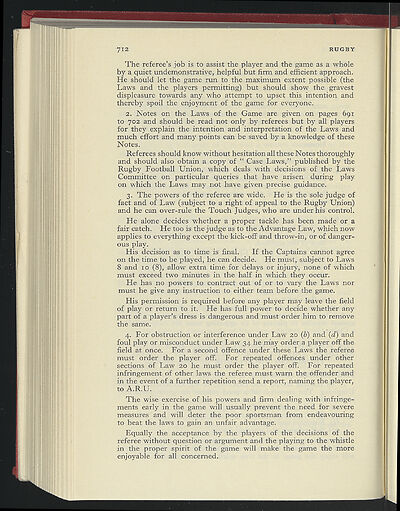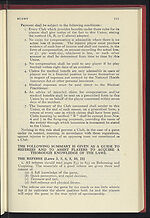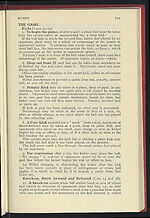1959-60
(784)
Download files
Complete book:
Individual page:
Thumbnail gallery: Grid view | List view

712 RUGBY
The referee's job is to assist the player and the game as a whole
by a quiet undemonstrative, helpful but firm and efficient approach.
He should let the game run to the maximum extent possible (the
Laws and the players permitting) but should show the gravest
displeasure towards any who attempt to upset this intention and
thereby spoil the enjoyment of the game for everyone.
z. Notes on the Laws of the Game are given on pages 691
to
7o2
and should be read not only by referees but by all players
for they explain the intention and interpretation of the Laws and
much effort and many points can be saved by a knowledge of these
Notes.
Referees should know without hesitation all these Notes thoroughly
and should also obtain a copy of " Case Laws," published by the
Rugby Football Union, which deals with decisions of the Laws
Committee on particular queries that have arisen during play
on which the Laws may not have given precise guidance.
3. The powers of the referee are wide. He is the sole judge of
fact and of Law (subject to a right of appeal to the Rugby Union)
and he can over-rule the Touch Judges, who are under his control.
He alone decides whether a proper tackle has been made or a
fair catch. He too is the judge as to the Advantage Law, which now
applies to everything except the kick-off and throw-in, or of danger-
ous play.
His decision as to time is final. If the Captains cannot agree
on the time to be played, he can decide. He must, subject to Laws
8 and
Io
(8), allow extra time for delays or injury, none of which
must exceed two minutes in the half in which they occur.
He has no powers to contract out of or to vary the Laws nor
must he give any instruction to either team before the game.
His permission is required before any player may leave the field
of play or return to it. He has full power to decide whether any
part of a player's dress is dangerous and must order him to remove
the same.
4. For obstruction or interference under Law zo
(b)
and
(d)
and
foul play or misconduct under Law 34 he may order a player off, the
field at once. For a second offence under these Laws the referee
must order the player off. For repeated offences under other
sections of Law
20
he must order the player off. For repeated
infringement of other laws the referee must warn the offender and
in the event of a further repetition send a report, naming the player,
to A.R.U.
The wise exercise of his powers and firm dealing with infringe-
ments early in the game will usually prevent the need for severe
measures and will deter the poor sportsman from endeavouring
to beat the laws to gain an unfair advantage.
Equally the acceptance by the players of the decisions of the
referee without question or argument and the playing to the whistle
in the proper spirit of the game will make the game the more
enjoyable for all concerned.
The referee's job is to assist the player and the game as a whole
by a quiet undemonstrative, helpful but firm and efficient approach.
He should let the game run to the maximum extent possible (the
Laws and the players permitting) but should show the gravest
displeasure towards any who attempt to upset this intention and
thereby spoil the enjoyment of the game for everyone.
z. Notes on the Laws of the Game are given on pages 691
to
7o2
and should be read not only by referees but by all players
for they explain the intention and interpretation of the Laws and
much effort and many points can be saved by a knowledge of these
Notes.
Referees should know without hesitation all these Notes thoroughly
and should also obtain a copy of " Case Laws," published by the
Rugby Football Union, which deals with decisions of the Laws
Committee on particular queries that have arisen during play
on which the Laws may not have given precise guidance.
3. The powers of the referee are wide. He is the sole judge of
fact and of Law (subject to a right of appeal to the Rugby Union)
and he can over-rule the Touch Judges, who are under his control.
He alone decides whether a proper tackle has been made or a
fair catch. He too is the judge as to the Advantage Law, which now
applies to everything except the kick-off and throw-in, or of danger-
ous play.
His decision as to time is final. If the Captains cannot agree
on the time to be played, he can decide. He must, subject to Laws
8 and
Io
(8), allow extra time for delays or injury, none of which
must exceed two minutes in the half in which they occur.
He has no powers to contract out of or to vary the Laws nor
must he give any instruction to either team before the game.
His permission is required before any player may leave the field
of play or return to it. He has full power to decide whether any
part of a player's dress is dangerous and must order him to remove
the same.
4. For obstruction or interference under Law zo
(b)
and
(d)
and
foul play or misconduct under Law 34 he may order a player off, the
field at once. For a second offence under these Laws the referee
must order the player off. For repeated offences under other
sections of Law
20
he must order the player off. For repeated
infringement of other laws the referee must warn the offender and
in the event of a further repetition send a report, naming the player,
to A.R.U.
The wise exercise of his powers and firm dealing with infringe-
ments early in the game will usually prevent the need for severe
measures and will deter the poor sportsman from endeavouring
to beat the laws to gain an unfair advantage.
Equally the acceptance by the players of the decisions of the
referee without question or argument and the playing to the whistle
in the proper spirit of the game will make the game the more
enjoyable for all concerned.
Set display mode to:
![]() Universal Viewer |
Universal Viewer | ![]() Mirador |
Large image | Transcription
Mirador |
Large image | Transcription
| Games and sports in the army > 1959-60 > (784) |
|---|
| Permanent URL | https://digital.nls.uk/248873230 |
|---|
| Description | 'Games and Sports in the Army' was an annual publication produced by the British War Office between the 1930s and 1960s. This included the Second World War. It outlines the rules and regulations for games and sports played by members of the armed forces. It features names and photographs of team members, and examples of contemporary advertising. |
|---|---|
| Shelfmark | GWB.52 |

